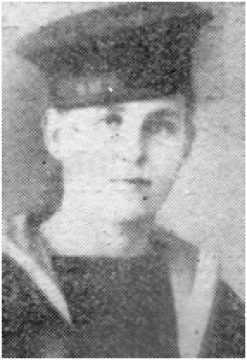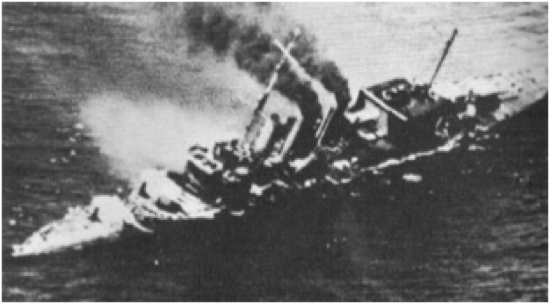Gerald William Leslie Wilson was born and raised in Chelmsford the son of a pub landlord. He lost his mother at a very young age. After leaving school he worked for the electrical engineers, Crompton-Parkinson Ltd., before joining the Royal Navy. He was killed in April 1942 when his ship was sunk by the Japanese. His home was The White Horse, Townfield Street. One of his brothers was killed while serving in the Royal Air Force.
Gerald William Leslie WILSON, Stoker 1st Class, H.M.S. Cornwall
Killed when his ship was sunk by Japanese bombers in the Indian Ocean. Aged 21
At the time of his death Gerald’s father was still the licencee of the White Horse in Townfield Street. Another Chelmsford man, Kenneth Thomas Parish, was amongst the 179 dead from H.M.S. Cornwall listed by the Commonwealth War Graves Commission.
A third Chelmsford man, 30 year-old Yeoman of Signals Leonard Cole, eldest son of Mr. and Mrs. Cole of 40 Cramphorn Road, survived the sinking and later described his experiences in a local newspaper:
“It was about two o’clock, when we were suddenly attacked. Bombs came screaming down; there were terrific explosions. The Japs had come in large numbers. It was soon evident that we were up against a ferocious concentrated attack, and our guns went quickly into action, firing at the diving ‘planes.
Right in the thick of it all, the Captain (Capt. Mainwaring) was struck by shrapnel. With blood flowing down his side, be kept uttering words of encouragement. ‘Give it to them, lads,’ he shouted. All the time bombs rained down upon the ship and all around it. It was hell. All the time, too, our guns kept firing. Very shortly the ship began to list heavily, and keeping one’s feet was a difficult matter, Only two of our boats remained; the rest had been shattered by bombs, shrapnel, and blast.
But still our gunners stuck to it. And still the Jap ‘planes roared down, releasing bomb load after bomb load. We managed to get what wounded we could into the two remaining boats and pushed them safely off.
Gerald was born in Chelmsford in 1921, the second youngest son of William George Wilson (1887-1946) and Beatrice Minnie Wilson (nee Hilliard) (1888-1923). His parents had married in 1908. Kenneth's siblings included Violet Dorothy B. Wilson (born in 1909), Pansy Irene M. Wilson (born in 1910), Iris V. P. Wilson (born in 1915), Derrick W. E. Wilson (born in 1919), and Kenneth Derek Gerald James Wilson (born in 1922).
On 19th November 1923, when Gerald was still an infant, his mother died, aged 35. She left an estate valued at £295 16s. to her husband, who was at the time licencee of the White Horse Inn, Townfield Street in Chelmsford.
Gerald joined the Royal Navy late in 1940, having voluntarily given up his work at the Chelmsford electrical engineers’ Crompton Parkinson.His brothers both served in the forces, with Derrick a survivor of the Dunkirk evacuation.
Gerald served as Stoker 1st Class P/SKX 271, H.M.S. Cornwall. Aged 21, he was killed on 5th April 1943, Easter Sunday, in the Indian Ocean when around 60 Japanese dive bombers attacked the British cruisers H.M.S. Dorsetshire and H.M.S. Cornwall, sinking them both. The 630 foot long H.M.S. Cornwall, which was hit by nine bombs, went down very quickly.


When the Cornwall was sinking fast we either slithered or plunged into the sea that was an ugly mess of black oil fuel. The ship went down to the bottom in twenty minutes after the attack, her screws still revolving and her guns still firing.
Survivors held on to fragments of wood; others were squatting as best they could on larger pieces of wood. Hundreds of heads seemed to be bobbing up and down.
As the Cornwall finally sank we all cheered - or those of us who able to do so. I don’t really know why we cheered, Then, in the swirl, we all tried to get together, more for company’s sake than anything else. We were black with the fuel oil - just like nigger minstrels... I was sitting on a plank; others were not so comfortable. The captain was a brick. Although he was up to the chin in water - he was on a sort of raft - he refused medical aid until the Monday afternoon. All the time he was bleeding. Then nearly thirty hours later, in the dusk of the Monday, one of our aircraft came over and signalled ‘Keep your chins up. Help is coming’. Soon afterwards I saw three funnels come up out of the horizon. Never have I been so glad to see a ship before. All of us were picked up and taken aboard.
Probably the most moving incident of the whole narrative is that of the boy telephone operator - he had not long before been recommended for a commission - who, just before the Cornwall sank, rang through to the officer in charge of communications. ‘What I do sir?’ he asked, amid the screaming of the bombs, ‘the telephone station is flooding’. The officer shouted ‘You had better leave the station at once’. ‘I can’t sir’, shouted the boy in reply ‘both my legs are off’.
He was a great chap. I think his arms had gone too. He was a former messenger of mine."
Gerald has no known grave and is one of almost 25,000 sailors who are commemorated by the Portsmouth Naval Memorial in Hampshire.
On 1st February 1943 Gerald’s youngest brother Kenneth Derek Gerald James Wilson lost his life, aged 20, at Dalton-in-Furness in Lancashire while serving with the Royal Air Force.
120504